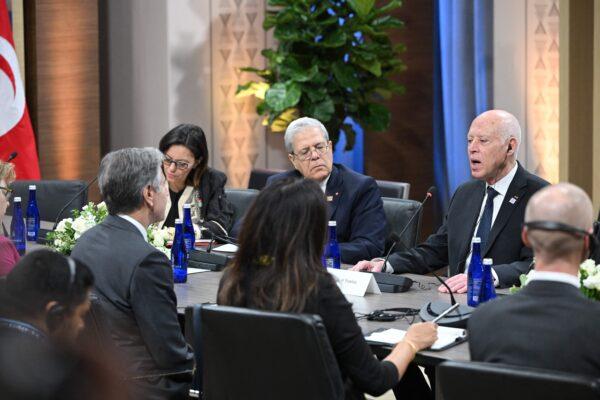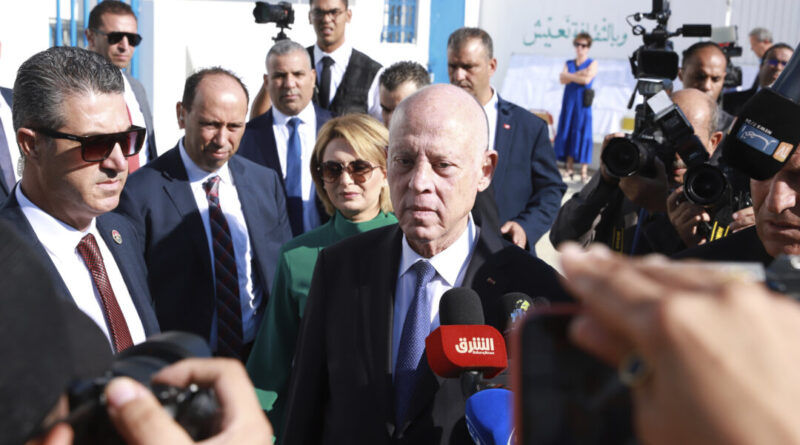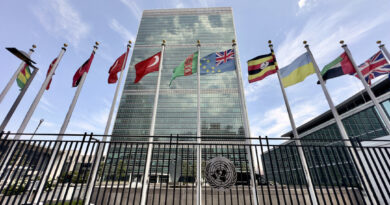Tunisian President Ready for Re-election Despite Opposition Boycott of Elections
The so-called Arab Spring began in Tunisia in December 2010, where critics say Kais Saied has undermined democratic gains.
Tunisia’s President Kais Saied is set to be re-elected after exit polls showed he achieved a landslide victory against his two opponents in Sunday’s election.
Exit polls from Sigma Conseil, an independent firm, suggested that Saied, 66, won 89 percent of the vote, decisively defeating Zouhair Maghzaoui—a former ally turned critic—and Ayachi Zammel, who sat out the election after being handed a 12-year prison sentence for violating election laws last month.
Three other leading politicians were barred from standing, and most of the main opposition parties urged their supporters to boycott the election.
Sigma Conseil estimated Zammel—whose attorney denies he forged voter signatures to qualify for the ballot—had won 6.9 percent of the vote and Maghzaoui 3.9 percent but suggested turnout had been as low as 28 percent, compared with 49 percent in 2019.
At his campaign headquarters on Monday, Saied said, “We’re going to cleanse the country of all the corrupt and schemers.”
Saied’s supporters see him as a leader Tunisia needs to rid itself of endemic corruption.
Layla Baccouchi, a Saied supporter, said, “We’re tired of the governance we had before. We want a leader who wants to work for Tunisia. This country was on the road to ruin.”
In July 2021, Saied used emergency powers to suspend parliament and later imprisoned dozens of political opponents on charges including inciting disorder, undermining state security, and violating a controversial anti-fake news law that critics say stifles freedom of speech and dissent.
A new constitution was drawn up which allowed the president to appoint the members of Tunisia’s election authority, the High Independent Authority for Elections (ISIE). The constitution was passed in a referendum in 2022.
ISIE has been criticized by opposition politicians this year for refusing to allow election monitors to observe the polls and for ignoring court rulings that ordered it to restore to the ballot candidates it had rejected.
At a protest in Tunis on Oct. 4, Siwar Gmati, a 27-year-old who works for I Watch, one of the non-governmental organizations whose application to monitor the polls was rejected, said, “We, as young people, are more attached to what the revolution brought to us. We were raised after the revolution to speak our minds.”
Unemployment remains high, at 16 percent, the government owes billions to international lenders, and an increasing number of Tunisians have joined the waves of illegal immigrants who try to cross the Mediterranean to Italy or Malta.

Secretary of State Antony Blinken (L, back to camera) meets with Tunisian President Kais Saied (R) during the U.S.-Africa Leaders Summit in Washington, on Dec. 14, 2022. Mandel Ngan/pool/AFP via Getty Images
The so-called Arab Spring began in Tunisia in Dec. 2010, when a vegetable vendor, Mohamed Bouazizi, set himself on fire in protest at conditions under President Zine El Abidine Ben Ali, who had ruled the country since 1987.
Ben Ali, who was accused of corruption and embezzlement, eventually fled into exile in Saudi Arabia, where he died in 2019.
Following the overthrow of Ben Ali in what became known as the Jasmine Revolution, Tunisia adopted a democratic constitution and established a “Truth and Dignity Commission” to bring to justice those responsible for alleged torture under the previous regime.
Four organizations that made up the Tunisian National Dialogue Quartet won the Nobel Peace Prize in 2015 for brokering a political compromise that led the country away from the violence and civil war seen in neighboring Libya.
Beji Caid Essebsi won Tunisia’s first democratic presidential election in 2014 but died in office, aged 92, in July 2019.
Later that year Saied—a lawyer and jurist who spent most of his life in academia—was first elected, standing on an anti-corruption ticket.
Saied has continued to rail against corruption during his five years as president but has also accused his opponents of being traitors against Tunisia.
Associated Press and Reuters contributed to this report.





